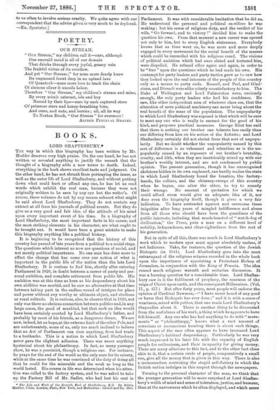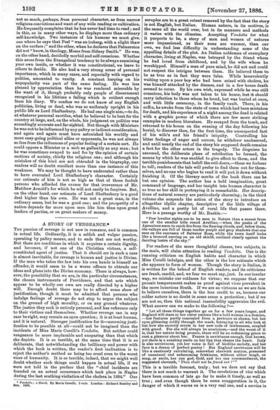BOOKS.
LORD SHAFTESBURY.*
'THE way in which this biography has been written by Mr. Hodder deserves very high praise. On the one hand, he has not written or revealed anything to justify the remark that the -thought of a biography adds a new terror to death. Indeed, everything in the book shows excellent taste and judgment. On the other hand, he has not shrunk from portraying the inner, as well as the outer life of Lord Shaftesbury, and without putting -down what could hurt or offend any one, he has let us read -words which exhibit the real man, because they were not originally written to be seen by any eye but the writer's. Of -course, these volumes do not by any means exhaust what might
• be said about Lord Shaftesbury. They do not contain any -extract at all from his journals of political events. But they -do give us a very good and fair idea of the attitude of his mind upon every important event of his time. In a biography of Lord Shaftesbury, the most important facts in his career, and the most striking elements in his character, are what ought to be brought out. It would have been a great mistake to make this biography anything like a political history.
It is beginning to be recognised that the history of this ,country has passed of late years from a political to a social stage. The questions which interest us now are questions of social, and not merely political importance. No one man has done more to -effect the change that has come over our notion of what is important in the public life of the nation than the late Lord Shaftesbury. It is curious to find him, shortly after entering Parliament in 1826, in doubt between a career of party and per- sonal ambition, and complete retirement from public life. His ambition was at this time as keen as his despondency about his own abilities was morbid, and he saw no alternative at that time between taking part in the endless round of intrigue for place -and power without any worthy or ultimate object, and studious or rural solitude. It is curious, also, to observe that in 1826, not only was there no obvious connection between politics and, in any large sense, the good of mankind, but that such an idea would have been certainly scouted by Lord Shaftesbury's father, and probably by most of his friends, as a dangerous dream. We are
mow, indeed, let us hope, at the extreme limit of the other Pole, and are unfortunately, some of us, only too much inclined to believe -that an Act of Parliament can care anything, from bad trade to a toothache. This is a notion to which Lord Shaftesbury never gave the slightest adhesion. There was never anything -hysterical about his philanthropy. In fact, as many passages show, he was a pessimist though a religions one. For instance, -he prays for the end of the world as the only cure for its misery, -while at the same time he was convinced of the duty of doing all that he could for the miserable and the weak as long as the -world lasted. His course in life was determined when his atten- tion was called to the factory system, and he was asked to take alp the Factory Bill of Mr. Sadler, who had lost his seat in
• The Life and Work of the Seventh Earl of Shaftesbury, B.G. By Edwin "Hodder. 3 vols. London, Paris, New York, and Melbourne : Cassell and Co. 1936.
Parliament. It was with considerable hesitation that be did so. He understood the personal and political sacrifices he was making ; but his sense of religious duty, and the verdict of his wife, "Go forward, and to victory !" decided him to make the question his own. From that moment a new career was opened not only to him, but to every English statesman. Everybody knows that as time went on, he was more and more deeply engaged in every movement for the social benefit of the masses which could be reconciled with his religious creed. The visions of political ambition which had once elated and tortured him, were dispelled. He refused office again and again, in order-to be "free "upon the questions which he had made his own. His contempt for party leaders and party tactics grew as he saw how they looked upon the real interests of the people of this country only as a means to party ends. Russell, and Peel, and Glad- stone, and Disraeli were alike utterly unsatisfactory to him. The Duke of Wellington and Lord Palmerston were, curiously enough, the only party leaders who had his confidence. He saw, like other independent men of whatever class see, that the alteration of mere political machinery can never bring about the real benefit of the mass of the population. The unpopularity to which Lord Shaftesbury was exposed is that which will be sure to meet any one who is really in earnest for the good of his kind, and proposes practical measures. George Eliot has said that there is nothing our brother can tolerate less easily than our differing from him on his notion of the Infinite ; and Lord Shaftesbury certainly did not shrink from that sort of unpopu- larity. But we doubt whether the unpopularity caused by this sort of difference is so vehement and relentless as is the un- popularity caused by an exposure of our brother's brutality, cruelty, and filth, when they are inextricably mixed up with our brother's worldly interest, and are not condemned by public opinion. The present generation, though it has unrecognised skeletons hidden in its own cupboard, can hardly realise the state in which Lord Shaftesbury found the lunatics, the factory- hands, the colliers, and the chimney-sweeps of this country when he began, one after the other, to try to remedy their wrongs. No amount of quotation for which we could afford room would give an adequate idea of it, nor does even the biography itself, though it gives a very fair indication. To have contended against and overcome these iniquities after long years of mingled indifference and abuse from all those who should have been the guardians of the public interests, including that much-boasted-of " watch-dog of civilisation," the Press, puts a man on a different level of nobility, independence, and clear.sightedness from the rest of his generation.
But in spite of all this, there was much in Lord Shaftesbury's work which to modern eyes must appear absolutely useless, if not ludicrous. Take, for instance, the question of the Jewish Bishopric (in 1841). Lord Shaftesbury goes into the most extravagant of the religious ectasies recorded in the whole book upon the importance of appointing a Protestant Bishop of Jerusalem, in conjunction with the King of Prussia. The idea roused much religious warmth and sectarian discussion. It was a burning question for a considerable time. Lord Shaftes- bury saw in it the fulfilment of prophecy, the nearness of the reign of Christ upon earth, and the consequent Millennium. (Vol. II., p. 477.) But after forty years, most people will endorse the opinion of Cardinal Newman,—" I have never heard of any good or harm that Bishopric has ever done ;" and it is with a sense of weariness, mixed with pathos, that one reads Lord Shaftesbury's rhapsodies about it. There is another thing to be discounted from the usefulness of his work, a thing which he appears to have felt himself. Any one who has had anything to do with" move- ments" or "philanthropy," knows what a vast amount of conscious or unconscious humbug there is about such things. This aspect of the case often appears to have increased Lord Shaftesbury's habitual despondency. Particularly he was very much impressed in his later life with the capacity of English people for enthusiasm, and their insapacity for giving money. There are many allusions to this fact, and to the other fact close akin to it, that a certain circle of people, comparatively a small one, give all the money that is given in this way. There is also a memorandum contesting the stupid self-flattery in which the British nation indulges in this respect through the newspapers.
Turning to the personal character of the man, we think that the younger generation will be more surprised at Lord Shaftes- bury's width of mind and sense of toleration, justice, and humour, than at the narrowness which he often displayed, and which arose not so much, perhaps, from personal character, as from narrow religions convictions and want of any wide reading or cultivation. He frequently complains that he has never had time to read ; and in this, as in many other ways, he displays more than ordinary self-knowledge. Two instances of his humour we must give. one where he says that Peel "was an iceberg, with a slight thaw on the surface ;" and the other, when he declares that Palmerston did not "know, in theology, Moses from Sidney Smith." He was, on the other band, decidedly morbid and self-conscious. Whether this arose from the Evangelical tendency to be always examining your own inside, or whether it was constitutional, we leave to others to decide. He also had a very strong sense of personal importance, which in many cases, and especially with regard to politics, amounted to vanity. A constant harping on his unpopularity was part of the same feeling. He was less pleased by appreciation than he was rendered miserable by the want of it, though probably only people of discernment recognised in his lifetime a failing which is evident enough from his diary. We confess we do not know of any English politician, living or dead, who was so uniformly upright in his public life as Lord Shaftesbury. He had one single aim,—to do, at whatever personal sacrifice, what he believed to be best for the country at large, and, on the whole, his judgment on politics was exceedingly accurate and far-sighted. But though with Ministers he was not to be influenced by any paltry or indirect consideration, and again and again must have astonished his worldly and more easy-going political allies or opponents, he was not always so free from the influences of popular feeling of a certain sort. He could oppose a Minister or a mob as gallantly as any man ; but he was sometimes swayed to and fro by the opinion of certain sections of society, chiefly the religious one ; and although his mistakes of this kind are not obtruded in the biography, our readers will no doubt recollect more than one instance of this weakness. We may be thought to have underrated rather than to have overrated Lord Shaftesbury's character. Certainly our estimate of him is not so high as that of those foolish persons who afforded the excuse for that irreverence of Mr. Matthew Arnold's for which he will not easily be forgiven. But, on the other hand, our estimate of Lord Shaftesbury is a good deal higher than his own. He was not a great man, in the ordinary sense, but he was a good one ; and the prosperity of a nation depends far more upon men like him than upon great leaders of parties, or on great makers of money.







































 Previous page
Previous page